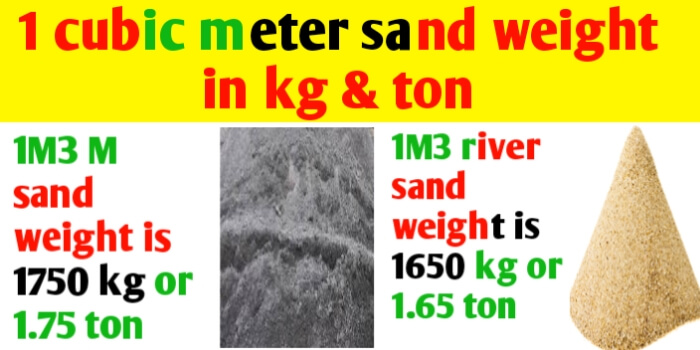The weight of 1 cubic meter of river sand is typically around 1,650 kilograms or 1.65 metric tons. For manufactured sand (M sand), the weight can vary, but it’s generally around 1,750 kilograms or 1.75 metric tons per cubic meter.
1 Cubic meter River & M sand weight in kg & ton, sand weight in tonnes and pounds, sand weight per m3, hi guys in this article we know about 1 cubic metre sand weight in kg & ton and weight of 1 cubic metre of river sand and M sand.
Generally sand measured in various unit like cubic metre (m3), cubic feet (cft), kilogram (kg) and ton.
Let us discuss first, Types of sand used in construction industry, there is Two types of sand which are extensively used in construction industry is naturally present River sand and artificial human made M sand by crushing of stone.
Do you know what is M sand? it is artificial and manufactured sand by crushing of granite stone in Crusher mill, it has fine particles used for construction line in various work like plastering of brick wall, brick work masonry, cement mortar,concrete formation, roof slab casting and formation of column, beam, footing and slab.
What is M sand full form? Generally M sand full form is manufactured sand, artificial sand or human-made sand. It is partial replacement of river sand in today construction line.
Do you know what is River sand? River sand is found in river basin, beach & desert areas naturally, the sand which are collected naturally from riverbed and basin for various purpose in construction line are known as the river sand.
River sand are formed by weathering and disintegration of various types of rocks slowly like granite rocks, basalt rock, igneous rocks, sedimentary and Metamorphic rock. Generally river sand is mixture of Metamorphic, sedimentary rocks and igneous rocks.
It is naturally available and extracted from the river beds or riverbank. Naturally, river sand easy available in the market, this sand larges use in construction.
1 Cubic meter River & M sand weight in kg & ton
Weight of river and M sand calculated in terms of m3 (cubic metre) & CFT (cubic feet), cubic yards, tons and pounds.
The typical weight of 1 cubic meter of different sand are following: Sand, wet : 1922kg, Sand, wet, packed: 2082kg, Sand, dry :1602kg, Sand, loose :1442kg, Sand, rammed : 1682kg and Sand, water filled : 1922kg.
The typical weight of 1 cubic meter (1m3) of dry natural sand is about 1,600kg (or 1.6 tonnes) and wet Sand is about 1,922kg (or 1.922 tonnes).
The typical weight of 1 cubic meter (1m3) of river sand is about 1,650kg (or 1.65 tonnes) and M-sand (manufactured sand) is about 1,750kg (or 1.75 tonnes).
The typical average weight of sand is 1,600 kg (1.6 tons) per cubic meter. River sand weighs about 1650 kg per cubic meter and M sand about 1750 kg per cubic meter.
1 cubic meter to kg River sand = 1650 kg, dry sand is about 1600 kg, wet sand is about 1922 kg and M sand is about 1750 kg.
1cum sand equal to how many tons? The typical weight of 1 cubic meter (1cum) of river sand is about 1.65 tons, M-sand (manufactured sand) is about 1.75 tons and wet sand is about 1.92 tons.
The typical weight of 1 cubic meter of sand is range from 1,442 to 2,082kg (or 1.442 to 2.082 tonnes). A typical dry natural sand weighs about 1,600 kg (1.6 MT) per cubic meter while a typical wet sand weighs about 1,992kg (1.992 MT) per cubic meter.

1 unit sand how many m3? The typical volume of 1 unit (100 CFT) of M sand is approximately 2.83 m3 (cubic meters). In general, 1 m3 (or 35.32 CFT) of M sand weighs about 1,750 kg and 1 unit of sand equals 100 CFT, so the volume of 1 unit of sand in a cubic meter = 100/35.32 = 2.83 m3.
Sand is one of the important ingredients at making concrete mortar & plaster, etc. Earth scientists and organization’s are now promoting the use of M-Sand (Manufactured Sand).
While measuring the quantity of sand at construction site in cubic meter you have the choice of selecting which type of sand you have required for purchasing for construction. If you purchase M sand then 1 cubic meter of M sand weight is slightly higher than River sand.
Generally sand available in market are in various categories wet loose sand, wet compact sand, dry loose sand & dry compact sand, All of category of sand some weight are vary. But in this calculation we take average
Average density of sand is 1,600 kg/m3. Its means 1,6 00 kg sand occupy 1 cubic metre of space or container, 1 cubic meter sand weight = 1,600kg, so 1,620kg is the weight of 1 cubic meter sand.
Sand weight
As per US customary measurement system, the typical weight of dry natural Sand is about 2,700 pounds per cubic Yard (or 1.35 US tons), which is approximately equal as 100 pound per cubic foot. This Sand weight is used for estimate purpose.
1 cubic meter sand weight in kg
The typical weight of 1 cubic meter of sand is range from 1,442 to 2,082kg (or 1.442 to 2.082 tonnes). A typical dry natural sand weighs about 1,600 kg (1.6 MT) per cubic meter while a typical wet sand weighs about 1,992kg (1.992 MT) per cubic meter.
Sand weight per m3
The typical weight of sand is range from 1,442 to 2,082kg per m3 (or 1.442 to 2.082 tonnes per m3). A typical dry natural sand weighs about 1,600 kg (1.6 MT) per m3 while a typical wet sand weighs about 1,992kg (1.992 MT) per m3.
How much does a cubic metre of sand weigh?
A cubic meter of typical sand weighs range from 1,442 to 2082kg (or 1.442 to 2.082 tonnes). One cubic metre of dry natural sand weighs about 1,600kg (1.6 MT) while a typical wet sand weighs about 1,992kg (1.992 MT) per cubic meter. However, weight of sand may vary according to their dry and moist condition and their composition.
1 cubic meter of sand to kg
Formula to convert 1 cubic meter of Sand to kg: weight of 1m3 of Sand = 1,600 kg. Taking DLBD of sand is 1600 kg/m3. Its means weight of 1 cubic meter of sand to kg is approximately equal to 1600 kg or 1.6 MT.
1 cubic meter sand to bags
Formula to convert 1 cubic meter Sand to bags: weight of 1m3 of Sand = 64 25kg small bags or 2 800kg bulk bags. In general sand bag available in 25 kg in a small size and in large size there is a bulk or jumbo bag of 0.5m3 or nearly 800kg. So, 1 cubic meter of Sand equals 64 25kg small bags or 2 800kg bulk bags of Sand.
Cubic meter to ton sand
Formula to convert cubic meter to ton sand: weight of 1 cubic meter Sand = 1.6 tons sand. You can multiply the given cubic meters of sand by 1.6 to get metric tons of sand, Tons of sand = Given m3 of sand ×1.6. 1 cubic metre of sand weighs around 1600kg and one metric ton or tonne equates as 1,000kg, so, 1 cubic metre of sand equates to 1.6 tons or tonnes.
To convert Tons of sand to cubic meter (m3), divide the metric tons of sand by 1.6 to get cubic meter of sand, Cubic meter of sand = Tons of sand ÷ 1.6. 1 cubic metre of sand weighs around 1600kg and one metric ton or tonne equates as 1000kg, so, 1 cubic metre of sand equates to 1.6 tons or tonnes.
Cubic metre to tonne:-Formula 1 cubic metre of Sand = 1.6 tonnes. In general 1 cubic metre of sand weighs around 1,600kg and one tonne equates as 1,000kg, so cubic metre to tonne such as 1,600/ 1,000 = 1.6 tonnes, hence 1 cubic metre of sand equates to 1.6 tonnes.
Tonne to cubic metre:- Formula 1.6 tonnes of sand = 1 cubic metre. In general one tonne equates as 1,000kg and 1 cubic metre of sand weighs around 1,600kg, so tonne to cubic metre such as 1,000/ 1,600 = 0.66 m3, hence 1 tonne of sand equates to 0.66 cubic metre.
1 tonne of sand = how many m3
1 tonne of Sand equals 0.66m3. In general one metric ton or tonne equates as 1,000kg and 1 cubic metre of sand weighs around 1,600kg, so 1 tonne of sand to cubic metre such as 1,000/ 1,600 = 0.66 m3, hence 1 tonne of sand equates to 0.66 m3.
1 unit sand how many m3
The typical volume of 1 unit (100 CFT) of M sand is approximately 2.83 m3 (cubic meter). In general 1m3 (or 35.32 CFT) of M sand weighs about 1,750 kg and 1 unit sand equals 100 CFT, so volume of 1 unit sand in cubic meter = 100/35.32 = 2.83 m3.

◆You Can Follow me on Facebook and Subscribe our Youtube Channel
You should also visits:-
1)what is concrete and its types and properties
2) concrete quantity calculation for staircase and its formula
Conclusions:-
The typical weight of 1 cubic meter (1m3) of river sand is about 1,650kg (or 1.65 tonnes) and M-sand (manufactured sand) is about 1,750kg (or 1.75 tonnes).